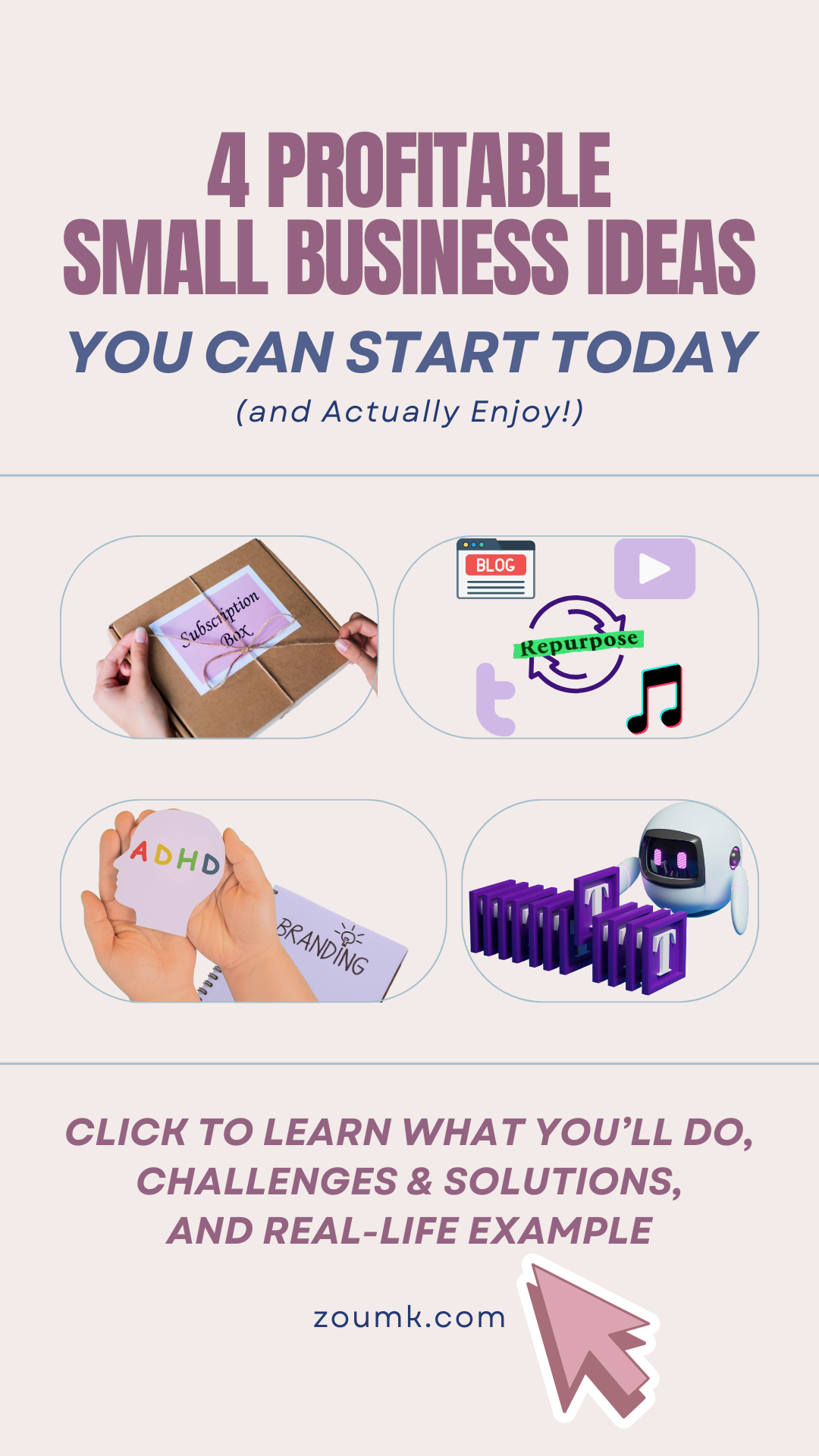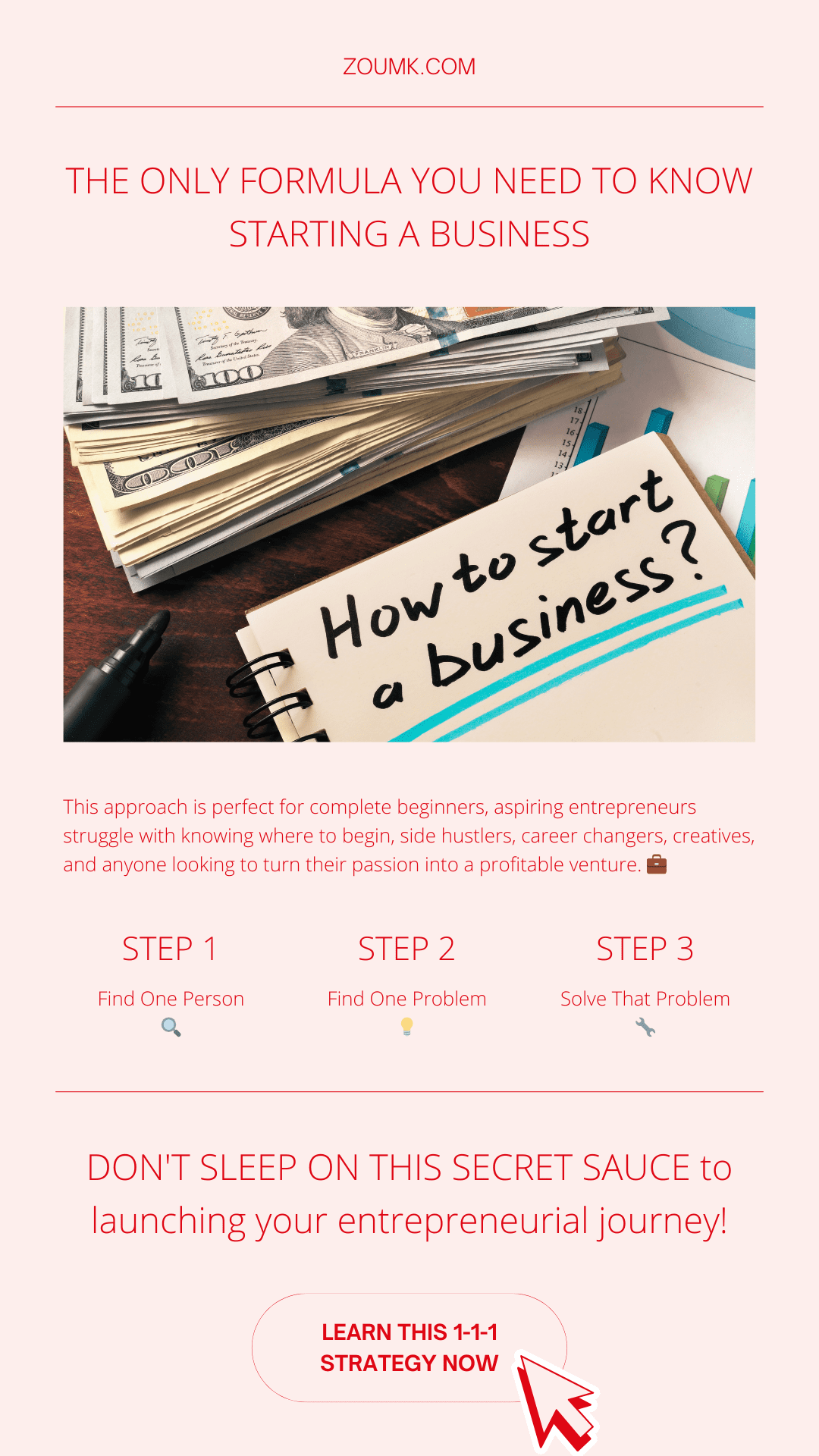Are you an aspiring entrepreneur, a young professional, a stay-at-home parent, or perhaps a college student looking to kickstart your own online business?
If so, you’ve landed in the right spot!
Today, we’re diving into the best and worst online business ideas for 2025 that are perfect for beginners.
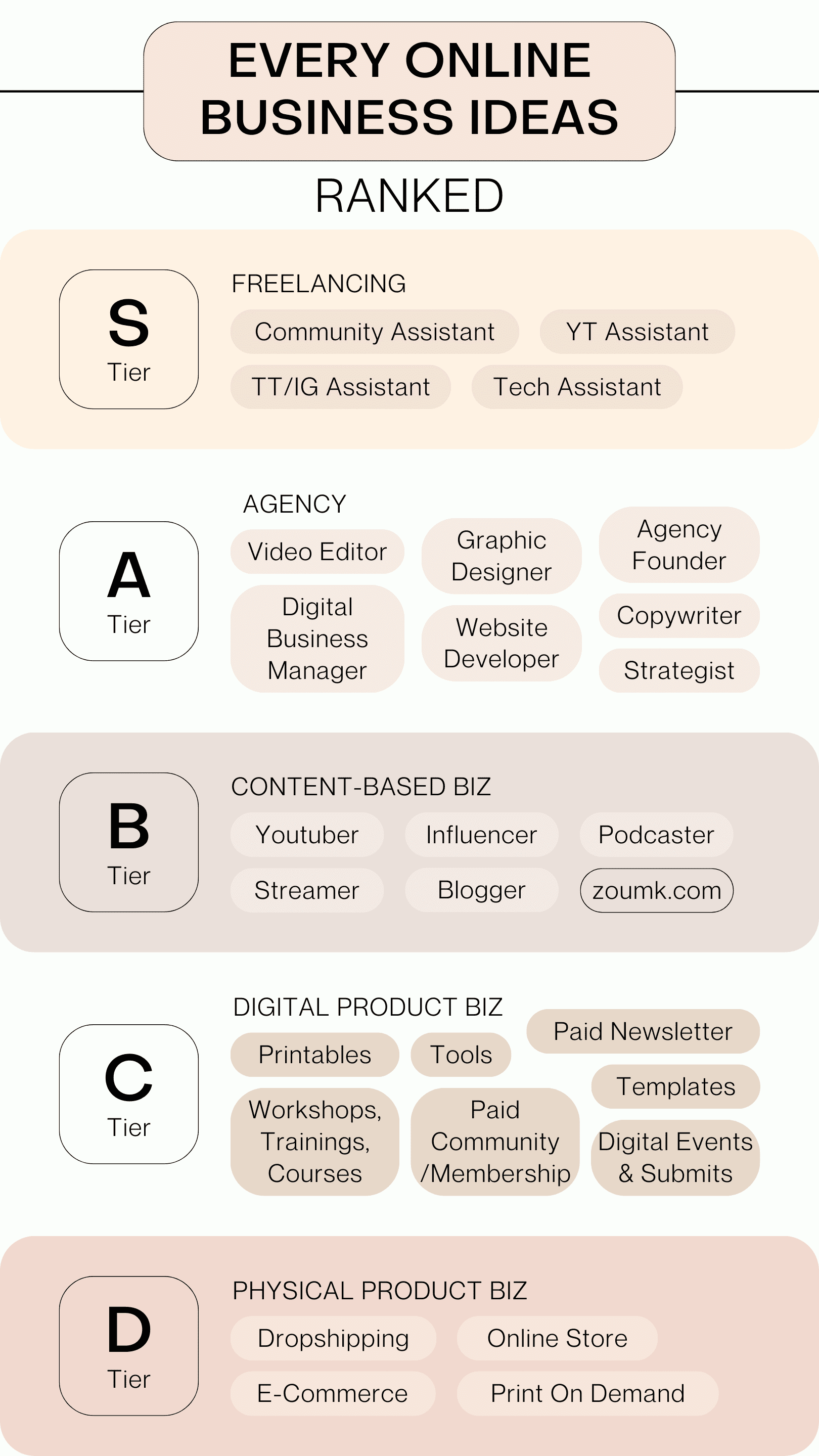
The Problem with Popular Business Ideas
Let’s face it: many online gurus will have you believe that e-commerce, dropshipping, print on demand, and affiliate marketing are the ultimate paths to passive income.
But here’s the catch: these are often the worst types of businesses FOR BEGINNERS!
Starting one of these can lead to wasted time and money.
So, what should you do instead?
Let’s break down some business ideas that don’t require much experience, or a hefty investment, and won’t leave you pulling your hair out in frustration.
But don't be feeling overwhelmed by all the options!
All business ideas can be grouped into three big types:
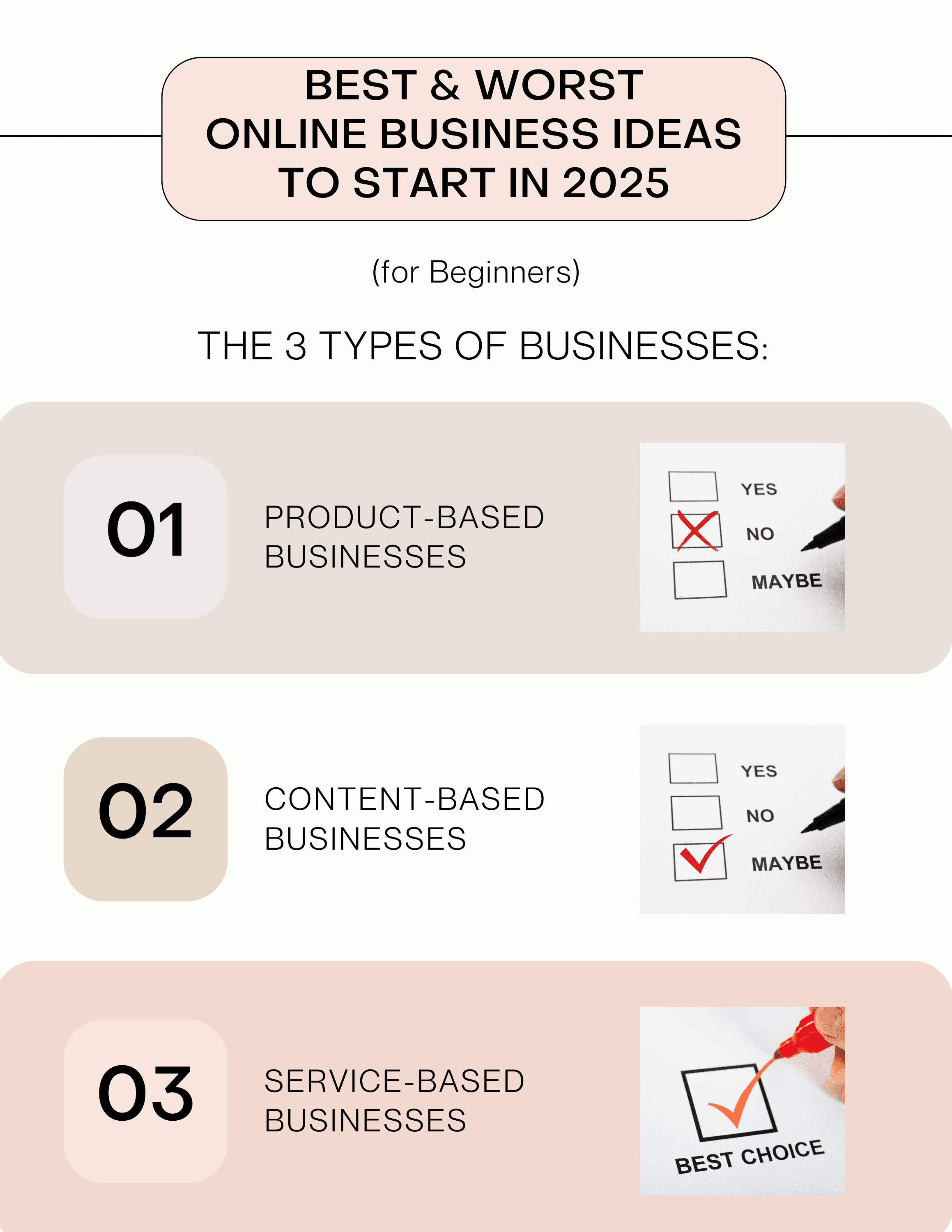
1. Product-Based Businesses
When we think about product-based businesses, we often envision selling physical items—anything from cat toys to couches!
However, let’s not forget about digital products, including templates, online courses, and e-books—anything intangible.
All of these are types of product-based businesses, and I’ve already put them in D tier for physical products and C tier for digital ones, because the reality of product-based businesses is that, like most businesses, they are way more complex than gurus will tell beginners!
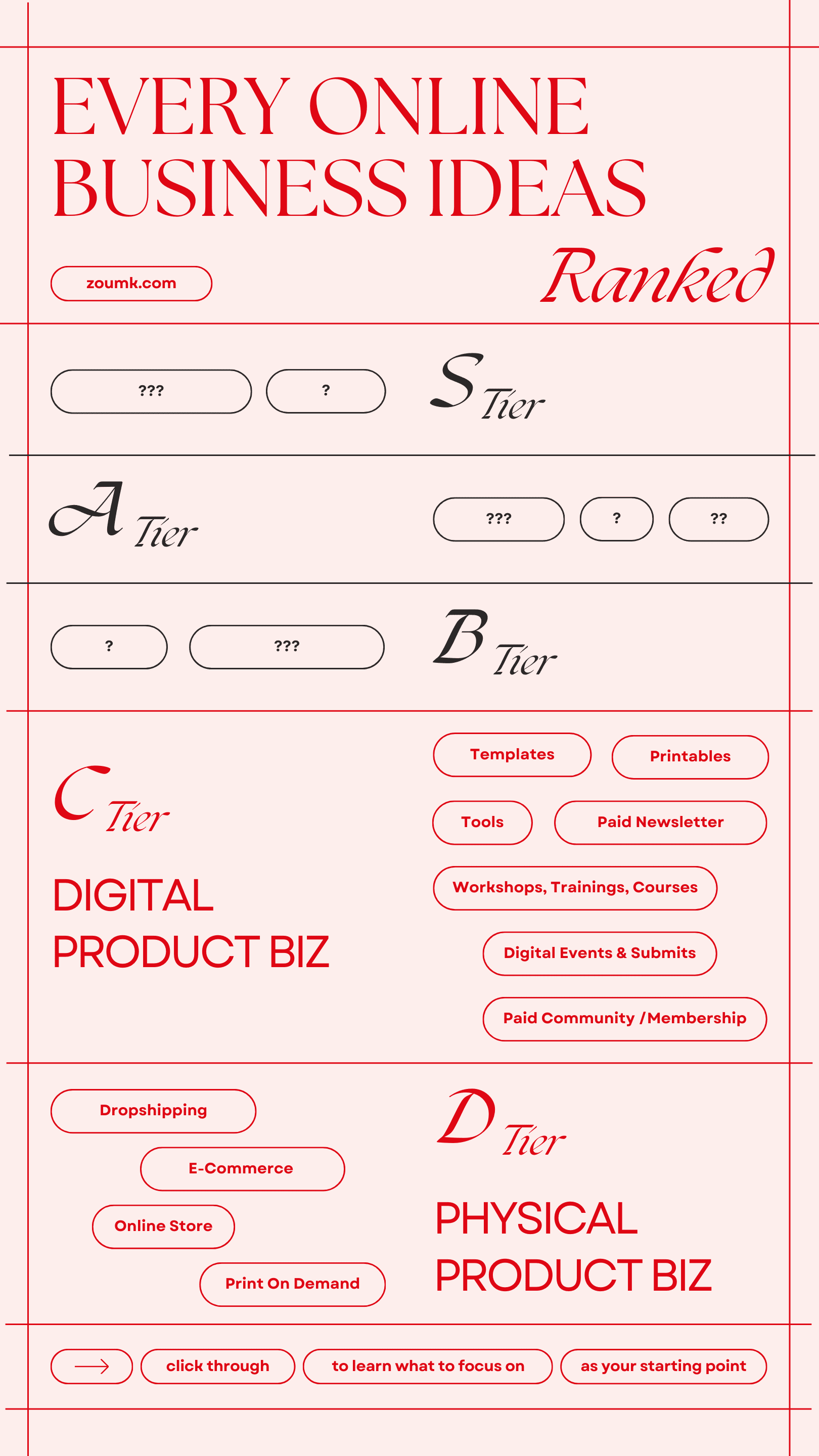
Now, let’s dive a little deeper into them:
#1: Physical Products
Physical products can be sold through dropshipping or an online store.
While there’s potential for big financial rewards if done correctly, there are significant downsides:
– Requires High Knowledge: You need to understand traffic and marketing.
– Initial Investment Needed: You must invest in producing the product and setting up your website.
– Long Wait for Profit: It may take months before seeing any income.
Imagine spending months creating a beautiful line of handcrafted jewelry, only to find that no one is interested in buying it.
That’s the reality many face with physical products!
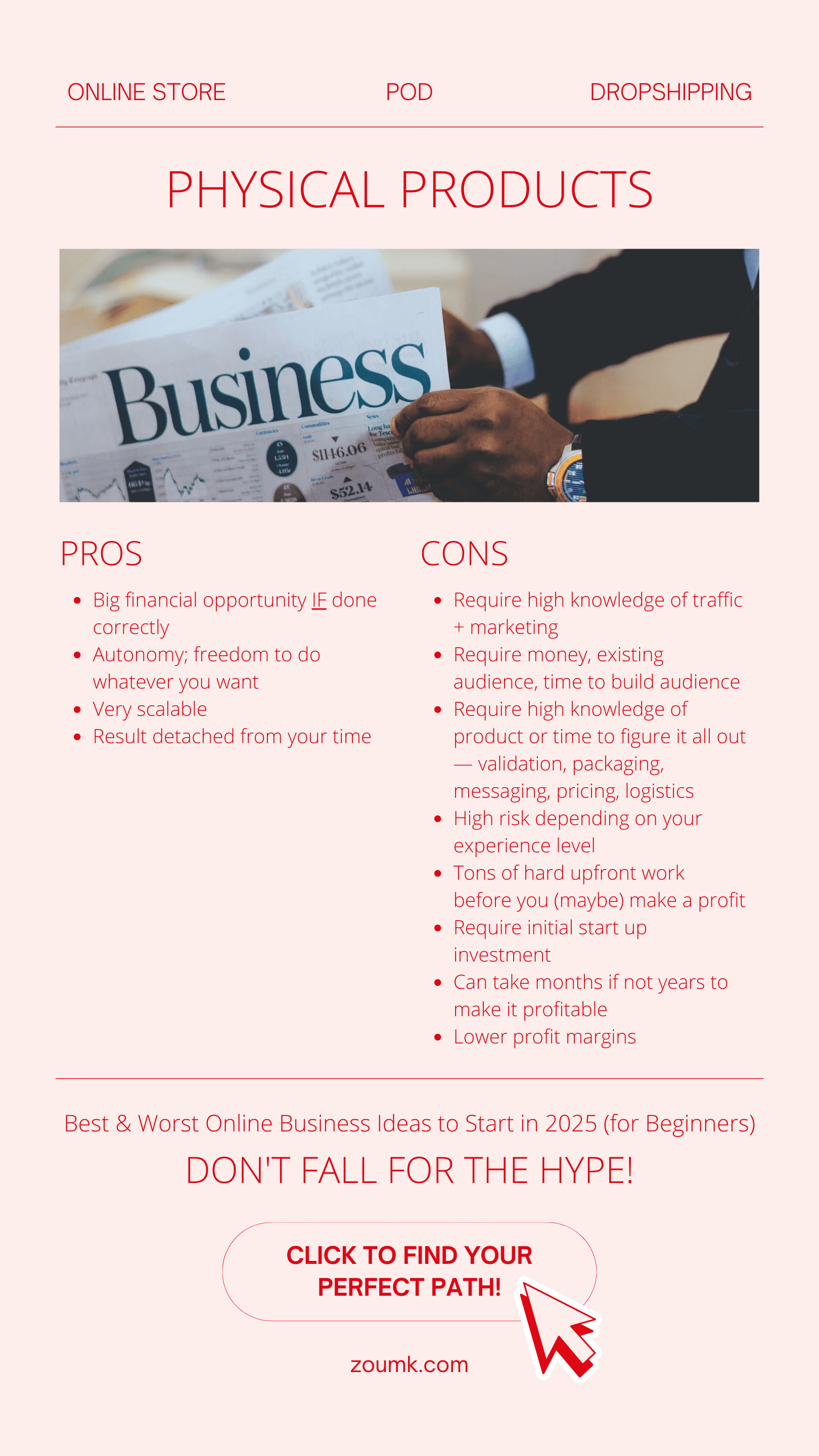
#2: Digital Products
Digital products include templates, online courses, e-books—anything intangible.
While they’re cheaper and faster to produce than physical goods, they come with their own set of challenges:
– High Competition: The barrier to entry is low, leading to many competitors.
– Requires Marketing Skills: You need knowledge of traffic sources and customer engagement.
While digital products can be lucrative, they’re not exactly easy money!
Many people think they can just whip up an e-book overnight and start raking in cash. Spoiler alert: it usually doesn’t work that way!
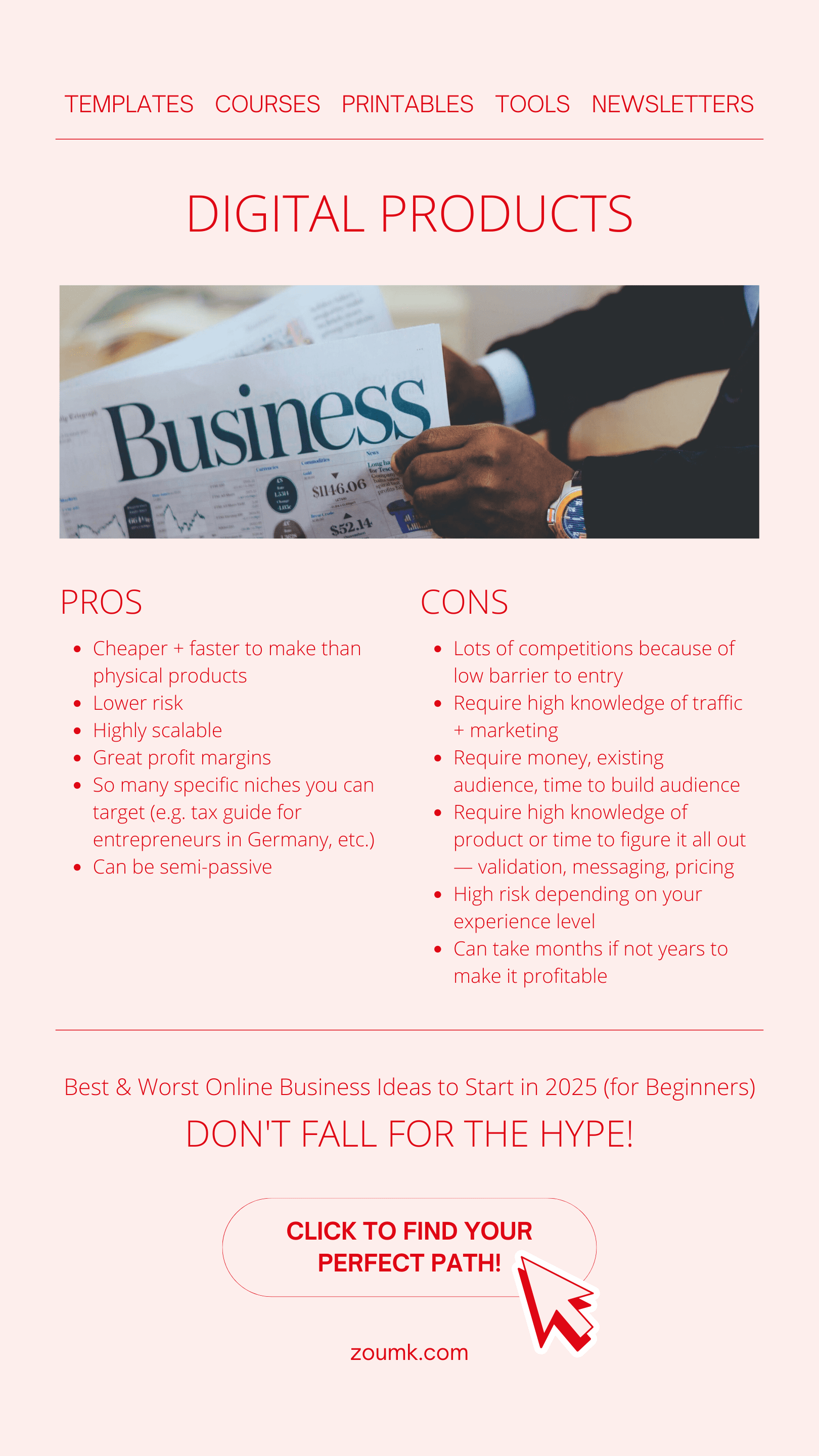
Why Product-Based Businesses Can Be Tricky
Let’s delve deeper into why product-based businesses often don’t pan out for beginners:
❗️ Market Research is Essential
– Before launching any product, understanding your target audience is crucial.
Who are they? What do they want?
– If you skip this step, you risk creating something no one wants.
❗️ Logistics Nightmares
– Managing inventory, shipping logistics, and returns can be overwhelming.
– If you choose dropshipping, you’re relying on third-party suppliers who may not always meet your standards or timelines.
❗️ Financial Risks
– Starting a product-based business often requires upfront investment—money that many beginners simply don’t have.
– Without sufficient funds or financial backing, it can lead to stress and failure.
❗️ Time Commitment
– Building a successful product-based business takes time—often years—before seeing significant profits.
– Many beginners expect quick returns but find themselves disillusioned after months of hard work without substantial income.
2. Content-Based Businesses
Have you ever thought about becoming a content creator?
Whether it’s YouTube videos, podcasts, or blogs, content-based businesses can open up multiple income streams:
– Pros: Ad revenue, sponsorships, and community building are just some benefits.
– Cons: The competition is fierce! It often takes months (or years) before you see any income.
If you’re passionate about a niche and willing to put in the upfront work without immediate returns, this could be a rewarding path.
However, be prepared for the long haul—many content creators toil away for years before hitting their stride!
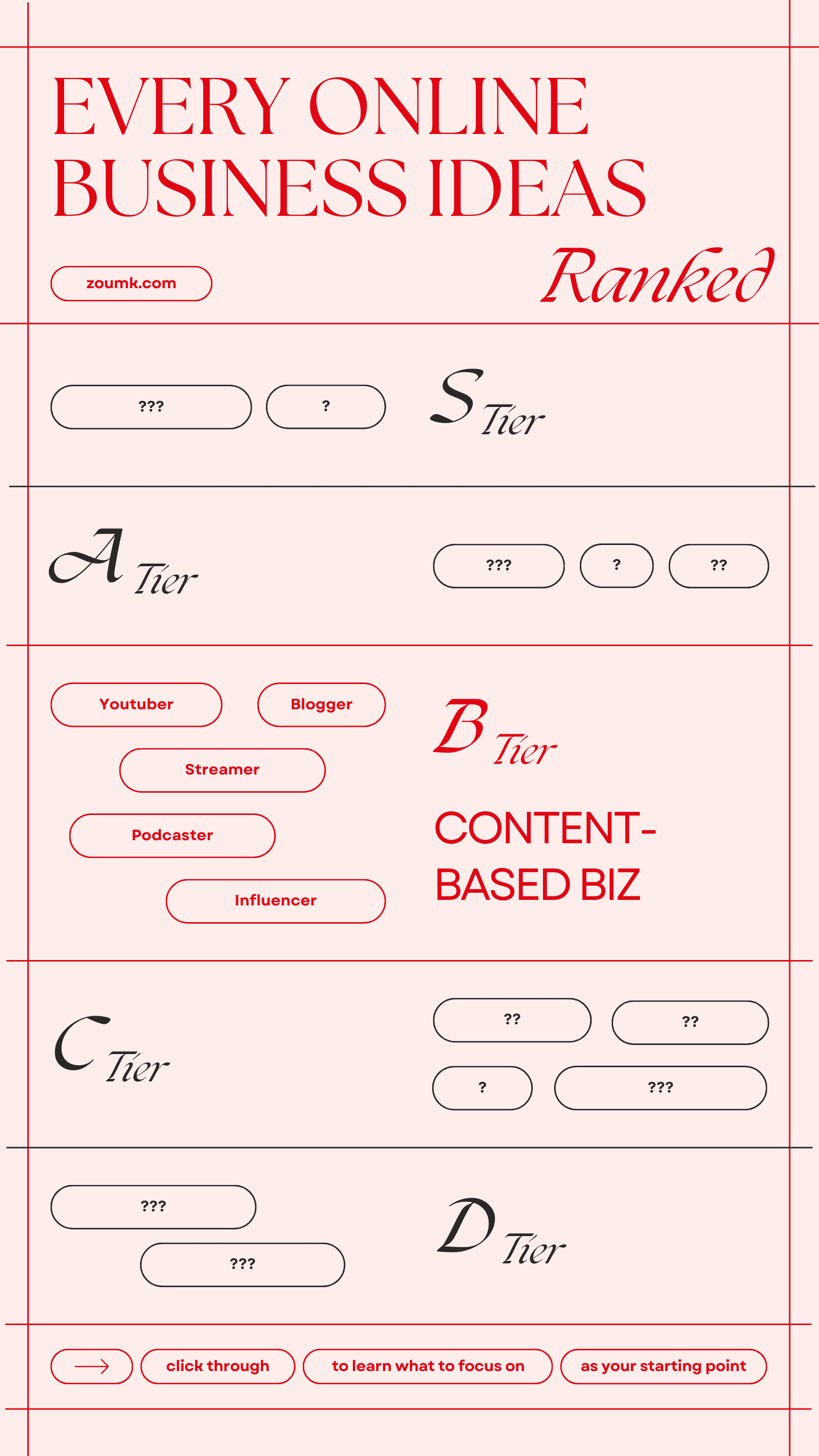
Why Content Creation Might Not Be for Everyone
Content creation might seem like a glamorous career choice—who wouldn’t want to make videos or write blogs for a living?
However, it comes with its own set of challenges:
❗️ High Competition
With so many creators vying for attention on platforms like TikTok and Instagram, standing out requires creativity and uniqueness.
❗️ Time-Intensive
– Creating quality content takes time—often more than anticipated.
– From scripting videos to editing them down for social media platforms requires dedication.
❗️ Building an Audience Also Takes Time
– It’s not just about creating content; it’s about getting people to notice it.
– You might spend countless hours crafting the perfect video only to have it seen by just a handful of viewers.
❗️ Emotional Investment
Many content creators pour their hearts into their work only to face criticism or lack of engagement from audiences.
This can be disheartening!
❗️ Monetization Isn’t Instantaneous
– Many platforms have specific requirements for monetization.
– For example, on YouTube, you need at least 1,000 subscribers and 4,000 watch hours in the past year before you can start earning ad revenue.
❗️ Burnout is Real
– Constantly coming up with fresh ideas can lead to burnout.
– It’s essential to pace yourself and take breaks when needed.
So that's why I would slot all of the content-based businesses into B tier, especially for beginners.
I think it's a good option to pursue on the side.
But the reason I rank it above product-based businesses is that, with content creation:
– You learn how to attract attention and drive traffic.
– You also have the opportunity to build an audience, which is crucial if you want to start a product-based business.
– When you begin creating content, you establish a communication loop with your audience.
– You start to understand their needs, their problems, and the solutions you could propose.
This process helps you tailor your offerings to better fit their requirements, which is why I place content-based businesses above product-based ones.
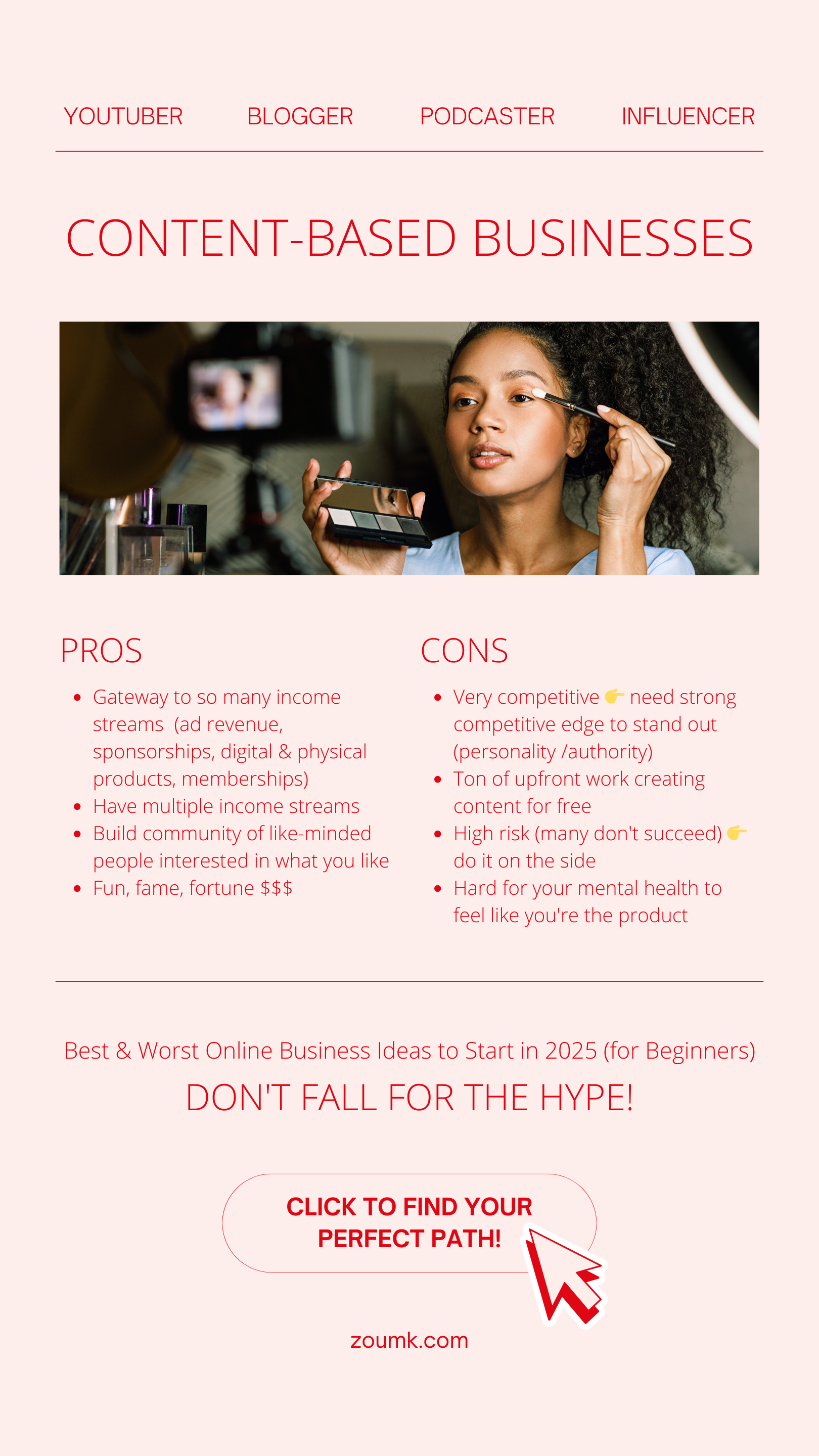
3. Service-Based Businesses
Drumroll please… This is where things get exciting!
So the third business type is what I’ve been building you up to, which I believe is the best option for beginners, and it is a service-based business.
Service-based businesses offer flexibility and lower risk compared to product-based ventures. That’s why I’ve put them in A and S tier.
Here’s a breakdown of the two types of service-based businesses:
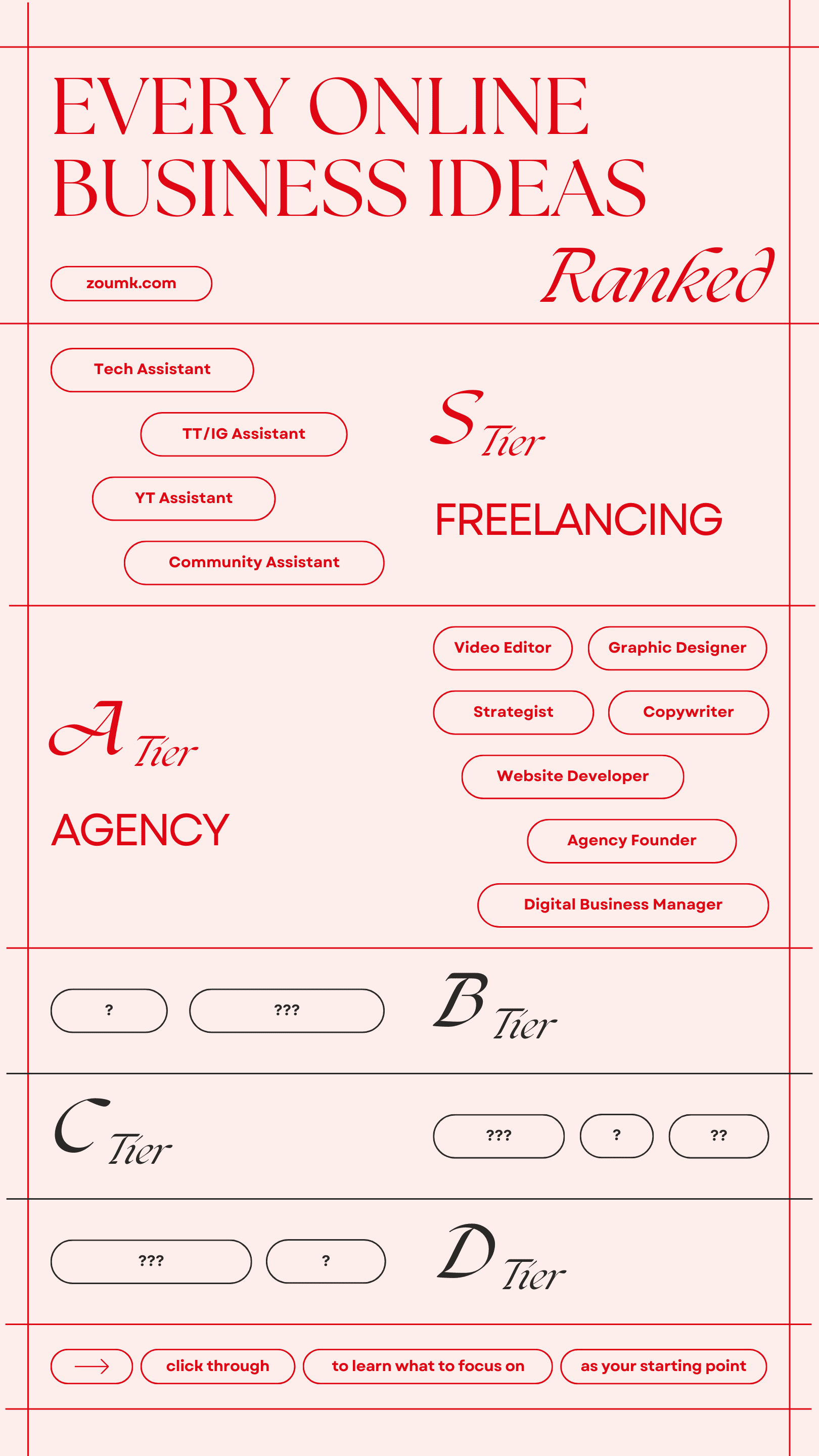
#1: Solo Service-Type Business, AKA Freelancing
Freelancing allows you to sell your skills—be it graphic design or project management—without needing extensive experience.
Here are the perks:
– Learning Opportunity: You gain invaluable insights into various industries.
– Income Potential: Once you establish yourself, the sky’s the limit!
However, keep in mind that income may be inconsistent initially as you build your client base.
Picture this: you’re working late into the night on a project that pays well, but might not come around again for months.
It’s a roller coaster ride!
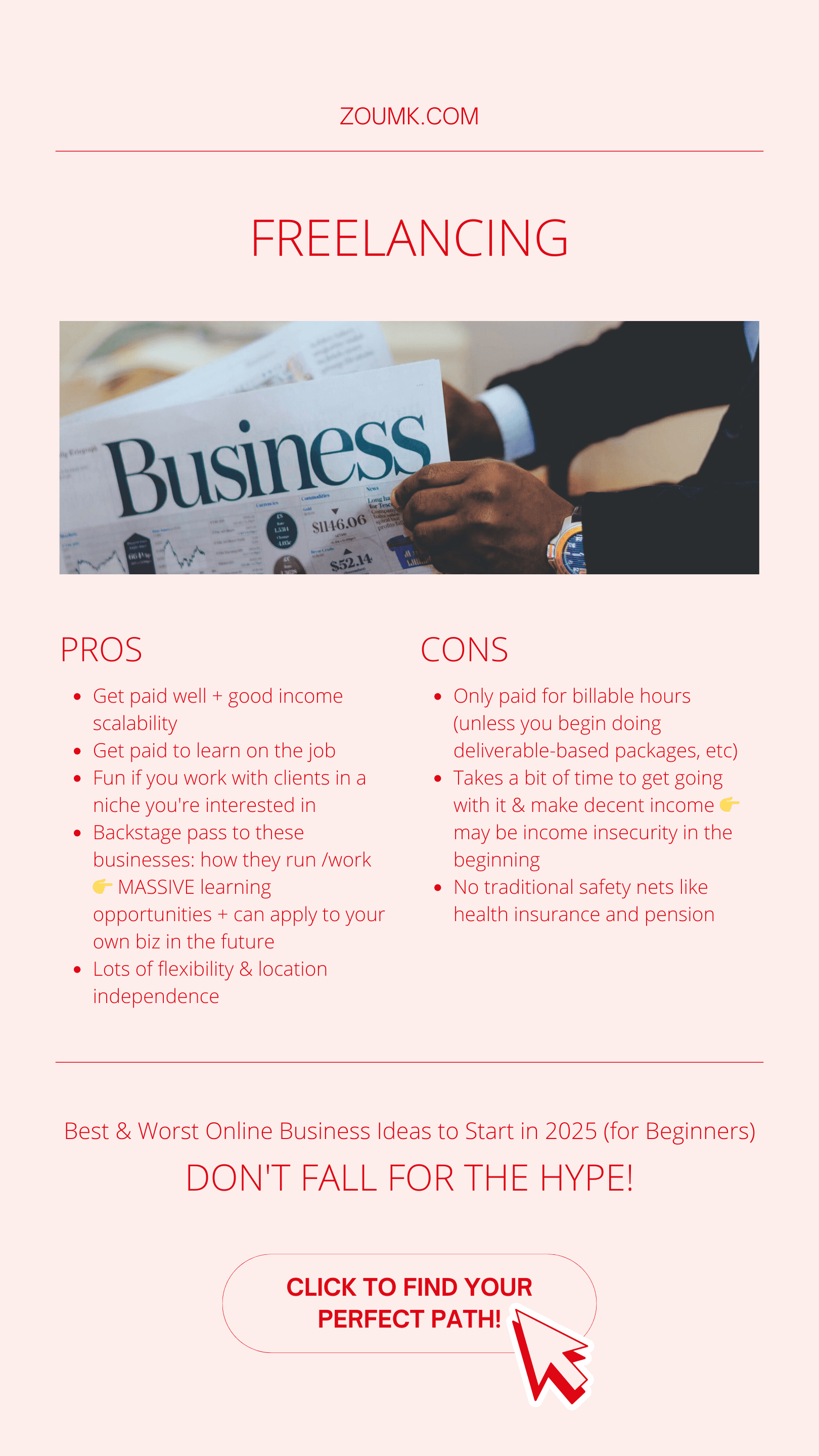
If you’re considering freelancing as your entry point into entrepreneurship:
– Identify Your Skills: What are you good at? Writing? Graphic design? Social media management? Make a list of your skills.
– Create an Online Presence: Set up profiles on platforms like Upwork or Fiverr where potential clients can find you.
– Start Networking: Reach out within your existing network or join online communities related to your skill set.
– Set Your Rates: Research what others charge for similar services and set competitive rates.
– Deliver Quality Work: Always strive for excellence; happy clients are likely to refer you to others!
#2: Agencies
Once you’ve gained enough experience as a freelancer, starting an agency could be your next step.
This model allows for scalability and higher profit margins but requires more responsibility and management skills.
If you’re ready for this leap:
– Build Your Team: Hire other freelancers or employees who complement your skills.
– Develop Systems: Create processes for onboarding clients and delivering services efficiently.
– Market Your Agency: Use social media and networking events to promote your agency services.
– Focus on Client Relationships: Building strong relationships will lead to repeat business and referrals.
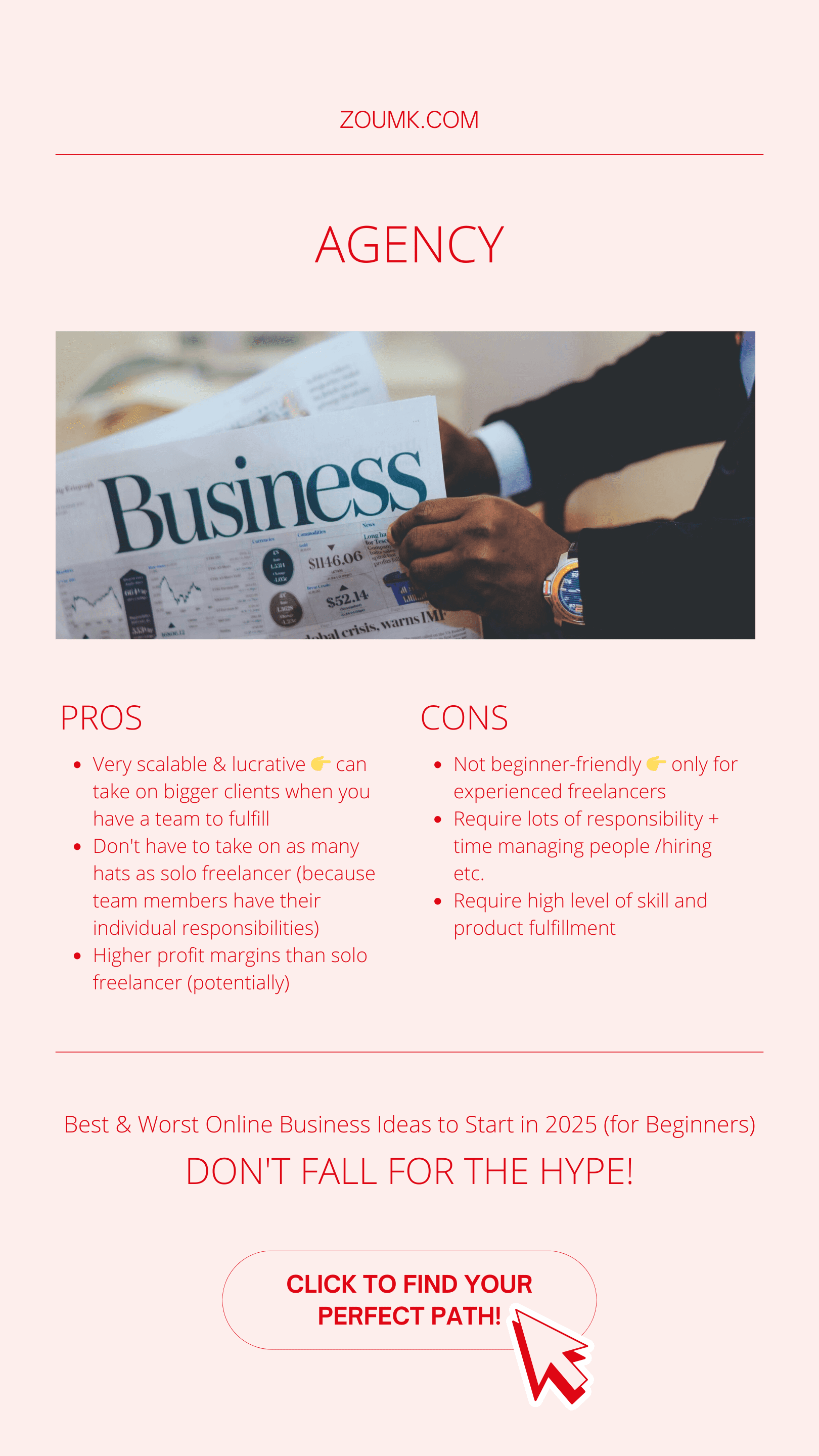
My First Freelancing Experience
I remember my first freelance gig like it was yesterday!
I had no clue what I was doing but was determined to learn on the job.
I Googled everything from client requests to invoicing tips!
It was challenging but incredibly rewarding when I finally landed my first consistent client—a small influencer seeking ghostwriting services on X (formerly Twitter).
That experience became the foundation for everything I’ve built since then; it taught me not only how to manage clients but also how different businesses operate behind the scenes!
The Roadmap for Beginners
Feeling overwhelmed by all these options? Don’t worry!
Here’s a simple roadmap:
Start as a
Freelancer
This is your gateway to learning while earning.
Gain
Experience
Use this time to understand different business models.
Transition to
Agency Work
Once you’re comfortable with freelancing basics consider expanding your services or starting an agency based on what you’ve learned!
Ideas of Building Your Own Online Business
To inspire you further, let’s explore some ideas for building your own online business across each model type:
Product-Based Business Idea
Let’s say you wanna turn your passion for baking into a thriving online bakery business.
Start small by selling cookies at local markets, but quickly transitioned online, as there is always demand beyond your neighborhood.
Then utilize social media platforms like Instagram and Facebook to showcase your creations connect with customers directly.
Finally, within two years, aim to expand your product line from cookies to custom cakes and even offer baking classes!
What do you think of this idea? Comment below with your thoughts 👇
Content-Based Business Idea
Maybe you’re a college student wanting to start a YouTube channel focused on tech reviews or other topics.
Initially, film on your phone with no fancy equipment; just focus on providing honest reviews of gadgets you love (and some you don’t!).
Consistently upload videos for over a year while engaging with your audience through the comments to gain as many subscribers as possible.
And the day you start earning money through ad revenue and sponsorships from tech companies eager to reach your audience will come!
If you found this idea and this post inspiring, save it for your journey ahead!
Service-Based Business Idea
When thinking about freelancers, idk why but it always reminds me of graphic designers. So let’s talk about that for now.
The ideal plan is to freelance while working full-time.
Start offering logo design services on Fiverr during your evenings after work.
As you build your portfolio through positive client feedback and word-of-mouth referrals from satisfied customers, you will eventually transition to running your own graphic design agency specializing in branding for small businesses!
If this idea inspires you, let me know in the comments! And don’t forget to save this post for when you’re ready to take the leap into freelancing!
Tips for Success in Online Business Ventures
Now that we’ve explored various business models, let’s discuss some tips that can help ensure your success regardless of which path you choose:

1. Do Your Research
Before diving headfirst into any business idea, conduct thorough research about market trends within your niche.
This will help minimize risks associated with launching new ventures!
2. Build an Online Presence Early On
Whether it’s through social media platforms creating your own website/blog, having an online presence will give potential customers insight into who you are as well as what products/services offer!
3. Network Like Your Life Depends On It!
Networking isn’t just about meeting people; it’s about building relationships that could lead directly back towards sales opportunities down the line.
Don’t underestimate its importance!
4. Stay Adaptable & Open-Minded
The world of online business is ever-changing; being adaptable means being able to pivot quickly when needed while remaining open-minded towards new ideas and strategies along way!
5. Celebrate Small Wins!
Don’t forget to celebrate small milestones throughout this journey!
Whether it’s landing your first client or reaching certain sales goals, acknowledging these moments will keep your motivation levels high!
Final Thoughts
Starting an online business in 2025 can be both exciting and daunting, especially for beginners.
The key is to choose wisely among the options available.
Focus on service-based businesses or content creation as your starting point.
These models not only require less upfront investment but also offer valuable learning experiences that can pave the way for future success.
By starting small and building your skills, you can transition into more complex business models over time.
Your adventure starts now—don’t wait any longer!
Remember, the goal is not just to make money but to find something that resonates with you and fits your lifestyle.
Choose a path that excites you, and don’t be afraid to pivot if something isn’t working.
Your entrepreneurial journey is uniquely yours—embrace it!
Don’t forget to save this post for later if you find yourself struggling to decide where to start your entrepreneurial journey.
And feel free to share this post with someone who needs these insights!

